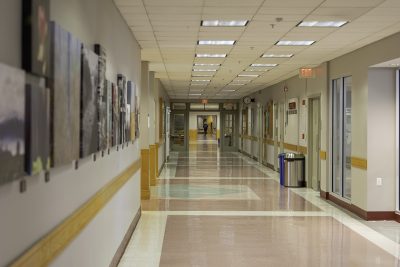
Boston University’s 4,171 faculty members had to adapt each of their courses to the University’s Learn from Anywhere format over the course of the past academic year. As BU gears up for a return to in-person learning next Fall, faculty say they hope to see a transition to pre-pandemic teaching while continuing to incorporate some tools from online learning.
“I’m definitely looking forward to just having more students in the same physical space as us,” film and television master lecturer John Hall said. “I’m very excited to feel their energy and curiosity and to get to know people better.”
Hall added the hybrid format creates a distance, “both physically and metaphorically,” between students, professors and even between members of faculty.
“It’s quite lonely, even here at work,” he said. “There’s not that many of us who are in-person on a daily basis, and so there’s very few opportunities to just have a friendly conversation with your colleagues.”
Despite the strained connection, the online shift led Hall and other professors to largely do away with physical, paper submissions entirely. Instead, Hall said he will likely continue using the electronic format options — such as Turnitin — for future semesters.
“I think we are going to be thinking more about ‘how does something come across in an electronic environment?’” he said, “that that’s something we have to be mindful of.”
Similarly to Hall, Sheryl Grace, an associate professor of mechanical engineering, said one of her classes — Introduction to Engineering Design — was restructured in a way that will likely remain going forward.
Normally, students complete a design project in groups over the course of the semester, Grace said. Following the introduction of LfA, the project was split into individual and group assignments.
“What they found was that making the individual assignments exist, which did not exist, actually made the students be a bit more honest and not rely on teams,” Grace said.
Hall and Grace both said they were curious as to whether classes continue to be taught through Zoom this Fall.
BU spokesperson Colin Riley wrote in an email the details of teaching next semester would be “clarified in the coming days and months,” as the university president and provost send out communications to the community.
Grace said she hopes and anticipates teaching will return to normal because it is difficult to teach courses, such as coding, over Zoom, given that the course relies on collaboration for effective learning.
“I understood that’s where we were headed,” she said, “and so I guess I’ll be depressed if that’s not because they just totally missed the ‘learning from each other’ part.”
Ibrahim Alazza, an advertising and graphic design professor, said the shift to a hybrid format was “strange” and “weird.” He said teaching a class with students from all over the world and in different time zones lead to challenges with class engagement.
“Dealing with students just waking up … and also students trying to get ready to go to bed,” he said, “it wasn’t that easy to keep everyone focusing for three hours.”
Alazza — a 2020 graduate from the School of Visual Arts — said adapting to an unfamiliar system was a difficult task when he began teaching as a part-time professor last semester.
“How can you work with two screens, plus the projector and maybe your laptop and the desktop and the computer within the classroom,” he said. “I was nervous as a teacher.”
Alazza said he hopes the “human, in-person interaction” will return to the classroom next year, which he said is an important aspect of studying the fine arts in particular.
“You’ve got to feel stuff, touch stuff, create something,” he said. “It’s a little bit hard through the screen.”
Ana Albuquerque, an associate professor of accounting, said she looks forward to seeing her students again but anticipates and supports health precautions as the university moves toward next semester.
“I would expect us to continue to be vigilant and still be wearing our masks when indoors,” she said, “but I’m very, very hopeful.”
Albuquerque said she is optimistic for an in-person return to the classroom, and teaching in front of her students would be “such a treat.”
“I think just that, plain and simple, makes me very happy,” Albuquerque said. “Just the thought of that.”






















































































































